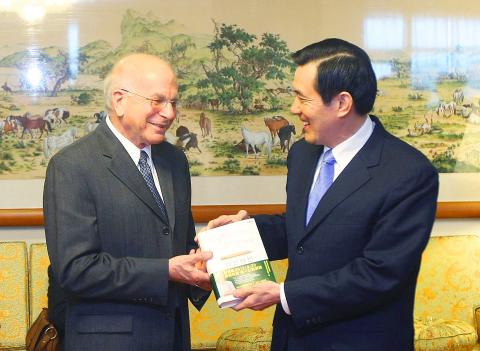|
Referendums can be
manipulated: Nobel laureate
Staff writer, with CNA

President Ma Ying-jeou yesterday
exchanges presents with Daniel Kahneman, winner of the 2002 Nobel Prize in
Economics.
Photo: CNA
The result of a proposed referendum on the
fate of the Fourth Nuclear Power Plant in Gongliao District (貢寮), New Taipei
City (新北市), will likely depend on how the question is phrased, a visiting
psychologist and Nobel prize winner said yesterday.
Daniel Kahneman, winner of the 2002 Nobel Prize in Economics, said the outcome
of a referendum can vary if the question is asked in different ways.
“You can manipulate the results by what we call framing your question, and that
I think is certainly an important issue,” said Kahneman, an Israeli-American
psychologist, who was invited by the Commonwealth Publishing Group to hold a
panel discussion in Taipei on rational thinking behind public decisionmaking.
“I have my doubts about the referendum method in general, because it tends to
lock principles into place and make deviations from these principles more
difficult,” he said, saying that referendums have been abused in many cases
across the US, such as in California.
Although a referendum represents important social values because it is an
instrument of democracy that gives people the right to choose, it must be used
carefully, he said.
Last month, President Ma Ying-jeou (馬英九) proposed holding a referendum on the
controversial power plant, which is still under construction.
The referendum will ask voters: “Do you agree that the construction of the
Fourth Nuclear Power Plant should be halted and that it not become operational?”
Critics of the referendum question fear that the question’s phrasing will allow
work on the nuclear power plant to continue by default because of the Referendum
Act (公民投票法), which requires at least half of eligible voters to participate in a
referendum for the result to be valid.
Kahneman also said that in gauging public opinion on the nuclear issue — which
he said centers on “fear” — the government must understand what is driving
opinion.
“We have to acknowledge the fact that people’s responses and people’s reaction
to situations are not constant over time; they will change,” the 79-year-old
said. “When something has been safe for a few years, people feel too safe, and
when there is a sense of threat, people feel too frightened and so the temporary
reactions are much more extreme than the long-term reactions and that is
something that has to be taken into consideration.”
Worries over the Fourth Nuclear Power Plant have galvanized opposition to the
use of nuclear power in Taiwan and led to several anti-nuclear protests, one of
which drew an estimated 200,000 people on March 9.
Ma said at the panel discussion that the proposed referendum on the fate of the
Fourth Nuclear Power Plant could play a key role in transforming Taiwan’s civil
society.
Given that it will take some time before the referendum is initiated, the
government will provide “adequate and transparent information” related to the
nuclear issue to the public to help voters make the best decision, Ma said.
|
![]()
![]()